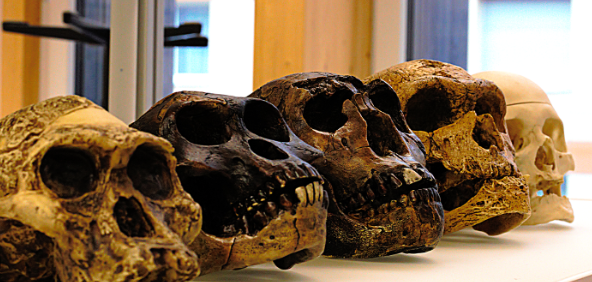According to a recent study, ancient humanity nearly disappeared when there were only 1,280 reproducing individuals on the planet 900,000 years ago. Furthermore, the population of our prehistoric ancestors remained this low for approximately 117,000 years.
A team of scientists from China, Italy and the United States built a new computer model on which the analysis was based, published in Science on August 31. Genetic data equivalent to 3,154 modern human genomes were used in the statistical procedure. The study estimates that 98.7% of our ancestors have been lost.
According to researchers, a gap in the fossil record may have caused the rise of a new species of hominid that was the ancestor of Neanderthals and modern humans, or Homo sapiens, and the population crash.
Jump to
- The thin line between life and extinction: a scientific revelation
- A study that is ‘provocative’
The thin line between life and extinction: a scientific revelation
 Credit: Canva
Credit: Canva
According to lead author Yi-Hsuan Pan, a researcher in evolutionary and functional genomics at East China Normal University, “The novel finding opens up a new field in human evolution because it evokes many questions, such as where these people lived, how survived catastrophic climate changes and whether natural selection during the bottleneck has accelerated the evolution of the human brain.”
The research team hypothesized that the Middle Pleistocene change, also known as population bottleneck, was accompanied by important climatic changes. Temperatures dropped and the climate became more arid as the glacial periods became longer and more intense.
Additionally, scientists hypothesized that the suppression of fire and a change in temperature that made conditions more favorable for human life may have contributed to a subsequent rapid population expansion that occurred about 813,000 years ago.
 Credit: Canva
Credit: Canva
According to the authors, the oldest evidence of cooking food with fire dates from 780,000 years ago in present-day Israel. Although ancient DNA has completely changed the way we think about past populations, the oldest human DNA is about 400,000 years old.
To estimate the number of populations at particular historical junctures, the computer model makes extensive use of the wealth of information on genetic diversity over time observed in contemporary human genomes.
The research team used genetic sequences from 40 non-African and 10 African populations.
A study that is ‘provocative’
 Credit: Popular Science
Credit: Popular Science
Commenting on the findings published in the same journal, Nick Ashton, Curator of the Paleolithic Collections at the British Museum, and Chris Stringer, Research Leader on Human Evolution at London’s Natural History Museum, called the work “provocative.” “.
According to the two academics who were not involved in the study, the study “highlighted the vulnerability of early human populations.”
With fossils from that period discovered in what is now China, Kenya, Ethiopia, Italy, Spain, and the United Kingdom, Ashton and Stringer argued that the fossil record, scant as it was, demonstrated that early human species lived on and off from Africa. Between 813,000 and 930,000 years ago, during the time of the proposed population collapse.
“Whatever caused the proposed bottleneck may have had limited effects on human populations outside of the Homo sapiens lineage or its effects were short-lived,” the two researchers wrote in their comments.
They went on to say that the projected bottleneck must be evaluated in light of historical and archaeological data.
what do you think about it? Let us know in the comments.
For more current stories, follow us on Telegram.
Categories: Trending
Source: vtt.edu.vn